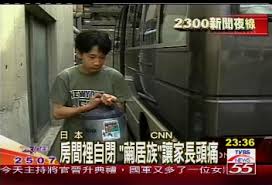歡迎您加入 英文/知識/交友 文章請點選欄位
周四(6/30)1.超商每年丟70億食物!2.繭居族
凌晨1:27
No comments
板橋站區文化路一段421巷11弄1號 (陽光甜味咖啡館)
埔捷運1號出口 旁邊7-11巷子進入20公尺 看到夏朵美髮左轉 PM 7:00-9:30


超商每年丟70億食物!
NT$7 billion worth of foods wasted every year: Taiwan's convenience store franchise association
Taiwan News
TAIPEI (Taiwan News) — Convenience stores such as 7-11 and FamilyMart have become a necessity for people living in Taiwan. Apart from selling groceries and snacks, convenience stores in Taiwan have developed a variety of cooked or fresh foods, including rice rolls, sandwiches, fruit, bento boxes, among many others, for customers to choose from. However, according to an association known as IFRA, as much as NT$7 billion’s worth of foods is left expired on shelves and thrown away due to policies of convenience store chains.
Chen Yen-chia (陳縯家), director of the IFRA, which dedicates itself to promoting the rights of franchise businesses, told United Daily News that four of the major convenience store brands in Taiwan have similar policies that demand franchises to stock up food products that are more than they can reasonably sell.
Chen said because of companies’ insistence that there must always be ample products on shelves, roughly five percent of cooked or fresh foods ordered into a franchise store are wasted on a daily basis.
The companies will say they’d rather have products left unsold than see an empty shelf, according to Chen.
The IFRA estimated that each franchise store can throw away roughly NT$2,000 worth of foods every day, which means that there is approximately NT$7 billion worth of foods discarded in over 10,000 franchise stores in Taiwan every year.
As a result, the IFRA started a campaign last month, calling for the four major convenience store brands to abandon the policies that force franchise stores to order unreasonable quantities of fresh and cooked foods. As of now, more than 300 stores have joined forces to support the campaign.
Nevertheless, some convenience store chains denied IFRA’s accusation, saying that they utilized statistics to decide and adjust the quantities of foods each franchise store should order, reported UDN.
Lee Ying-yuan (李應元), minister of the Environmental Protection Administration, said theoretically, convenience stores have mechanisms to control order quantities for their franchise stores. However, the agency is aware of the complaints made by franchise businesses and is therefore willing to offer assistance for both convenience store companies and their franchises in order to find out the best way to reduce food waste, added the minister.
繭居族
In Japan, hundreds of thousands of young people are refusing to leave their homes — Quartz
Lila MacLellan
The phenomenon, called “hikikomori,” is defined by the Japanese Health, Labor and Welfare Ministry as people who haven’t left their homes or interacted with others for at least six months. Of the 541,000 people between age 15 and 39 who fit that description, 34% have spent seven years or more in self-isolation. Another 29% have lived in reclusion for three to five years.
Hikikomori (the term is used for both the condition and its subjects) surfaced as a phenomenon in Japan in the 1990s. At the time, some experts estimated that about one million people, mostly young men in their 20s, were spending their days locked up in their bedrooms, reading manga (comic books), watching TV, or playing video games. They refused to work or go to school and often didn’t communicate with family members, let alone friends.
There’s no standard course of treatment. Doctors believe the condition, which is not yet classified as an official disorder, is caused by a mix of psychological and societal influences. It’s far more common in men, who face more cultural pressure to succeed socially and professionally than women do. According to the New York Times:
“Men start to feel the pressure in junior high school, and their success is largely defined in a couple of years,” said James Roberson, a cultural anthropologist at Tokyo Jogakkan College and an editor of the book “Men and Masculinities in Contemporary Japan.” “Hikikomori is a resistance to that pressure. Some of them are saying: ‘To hell with it. I don’t like it and I don’t do well.”‘
To fail at work or school is to risk social exclusion, something that can be avoided by voluntarily withdrawing from the world. For some, personal setbacks lead to feelings of severe inadequacy, triggering crippling anxiety.
In 2010, a Japanese cabinet report estimated there were just under 700,000 hikikomori in Japan, which suggests that their numbers are shrinking. Experts say the government’s findings are unreliable, however, since its survey only included people aged 15 to 39. Tens of thousands of men with the condition have likely aged out of the report’s demographic window. What’s more, although hikikomori usually begins in adolescence or in one’s twenties, it can also strike in mid-life. Last winter, the Japan Times reported that a growing number of men in their mid-40s were falling through “widening cracks in the social fabric,” and exhibiting “hikikomori-like behaviors,” usually after being laid off from work.
訂閱:
張貼留言 (Atom)


















0 意見:
張貼留言